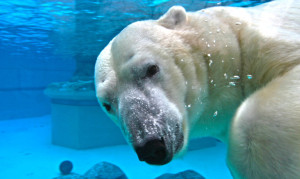
Scientists have suspected that brain size is linked to intelligence, but there’s not been enough evidence to show that a bigger brain predicts cognitive ability.
To gather the evidence,researchers traveled to nine US zoos and presented 140 animals from 39 different mammalian carnivore species with a novel problem-solving task.
The study included polar bears, arctic foxes, tigers, river otters, wolves, spotted hyenas, and some rare, exotic species, such as binturongs, snow leopards, and wolverines.
Each animal was given 30 minutes to extract food from a metal box, closed with a bolt latch. The box was scaled to the animal’s size and baited with each study animal’s preferred food—red pandas received bamboo and snow leopards got steak.
“Does a larger brain imply greater intelligence?” asks George Gilchrist, program director in the National Science Foundation’s Division of Environmental Biology, which helped fund the research. “This is a key question for those studying brain evolution.
“These researchers devised a clever puzzle that could be presented to multiple species—and discovered a strong correlation between relatively large brain size and problem-solving ability.”
70% SUCCESS RATE FOR BEARS
Overall, 35 percent of the animals successfully solved the problem. The bears had an almost 70 percent success rate, and meerkats and mongooses were the least successful, with no individuals from their species solving the problem.
“Our results are robust, showing that having a larger brain really does improve the animal’s ability to solve a problem it has never encountered before,” says Kay Holekamp, Michigan State University professor of integrative biology and the paper’s senior author.
“This study offers a rare look at problem solving in carnivores, and the results provide important support for the claim that brain size reflects an animal’s problem-solving abilities and enhance our understanding of why larger brains evolved in some species,” says Sarah Benson-Amram, University of Wyoming scientist and first author of the paper published in the Proceedings of the National Academy of Sciences.
The study also showed that neither manual dexterity nor living in larger social groups improved problem-solving success.
“A hypothesis that has garnered much support in primate studies is ‘the social brain hypothesis,’ which proposes that larger brains evolved to deal with challenges in the social domain,” says Holekamp. “This hypothesis suggests that intelligence evolved to enable animals to anticipate, respond to and perhaps, even manipulate the actions of others in their social groups.
“If the social brain hypothesis can predict success at solving nonsocial problems, then we would expect that species that live in larger social groups should be more intelligent. However, we did not find any support for that prediction in this study.”
Scientists from the University of Michigan and University of Minnesota were also part of this research team.
NSF’s Divisions of Biological Infrastructure and Integrative Organismal Systems also provided support.
Source: Michigan State University and Futurity.org




